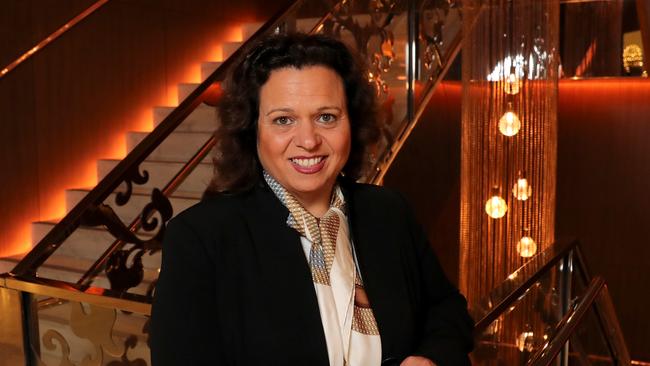Writedown an option as Labor vows to repair NBN
Fixing the broken business model of the NBN will be Labor’s key priority if it comes to power at the next election.

Fixing the broken business model of the National Broadband Network will be Labor’s key priority if it comes to power at the next election, with a potential multi-billion- dollar writedown a live option, according to the opposition communications spokeswoman Michelle Rowland.
“The Coalition has ruled out a writedown but we are keeping all of our options open,” she told The Australian.
“There’s little wriggle room for either government, whoever wins the next election. There is no way NBN Co is going to meet its average revenue per user forecast [$51 by 2021-22] and there are alternative players popping up everywhere.”
Ms Rowland’s comments highlight the growing recognition inside Labor that the NBN, conceived under its watch and then modified by the Coalition, needs an overhaul, including possibly writing off some of the $50 billion invested in the project.
This would substantially reduce the NBN’s return hurdles and free the broadband operator to allow telcos to buy more capacity more cheaply and in turn offer higher-speed broadband services to consumers.
However, such a move would come at a substantial cost, given any writedown would have to be taken through the budget, which would cause a blowout in the deficit, delaying a return to surplus.
“We need to focus on the main game, which is the economics of the NBN, and a lot of that is tied to technology choice and decisions made by the Coalition government. We think there are opportunities for us pick our battles strategically,” Ms Rowland said.
While the Coalition government and NBN Co maintain there is no need for the project to be bailed out, industry watchers are far from convinced.
In July, ratings agency S&P Global Ratings warned that a writedown of the NBN was inevitable, with the high prices required to keep the project financially viable reducing service quality for consumers and forcing telcos to look at NBN alternatives.
NBN Co said in its latest corporate plan, released in August, that it expected an internal rate of return of 3.2 per cent, at the lower end of the previously flagged guidance of 3.2 per cent to 3.7 per cent.
Writing off a portion of the cost of the NBN rollout would reduce the financial pressure on NBN Co,
Ms Rowland said a writedown will need to put the interests of consumers first. “It will partly be about enabling retailers to become more viable but also delivering a good consumer outcome; they do feed off one another.”
Finance Minister Mathias Cormann last week told The Australian the government was not working on a financial restructure, and had improved the NBN’s board and management and “turned this project around”.
“The NBN 2019 corporate plan released on 31 August 2018 clearly outlines NBN’s strong pathway to a sustainable, operational company, delivering the government a 3.2 per cent return on its investment,” he said.
Senator Cormann said the government expected a privatisation of NBN Co “at the appropriate time”.
A decade since its inception, the NBN has caused enormous disruption to the sector, with the forced migration of customers from the Telstra wholesale access monopoly to the NBN not only leading to a rise in customer complaints but also squeezing the margins of service providers.
Australia was ranked 55th in the world for fixed broadband speed in the recent Ookla Speed Test Global Index, with an average download speed of 25.9 megabits per second. The average download speed for fixed connections is 40.7Mbps. The lowest entry-level unlimited NBN plan in the market starts at $40 a month but the average fixed-line broadband price is edging towards $75 a month.
Telstra’s transition from a monopoly player to an NBN reseller has already seen it shed tens of billions of dollars in shareholder value and pushed it to overhaul its business. The slim margins have forced Optus to focus on mobile and fixed wireless services and prompted TPG and Vodafone Hutchison Australia to negotiate a merger.
“On one level the last 10 years haven’t been productive for consumer service but it has spurred telcos to innovate in reaction to the NBN,” Ms Rowland said.
“There has been a shift in how people look at the NBN, from ‘when I am getting the NBN?’ to ‘please keep it away from me’.”
She added that the multi-technology approach, which was designed to help roll out the NBN faster, had failed to live up to its promise, with the suspension of services on the hybrid coaxial fibre portion of the NBN last year an example of its poor policy.
Industry analyst Robert James of iMediate Consulting said NBN Co could either stick with its high wholesale prices and lose customers, or it could reduce prices and fail to meet revenue targets.



To join the conversation, please log in. Don't have an account? Register
Join the conversation, you are commenting as Logout